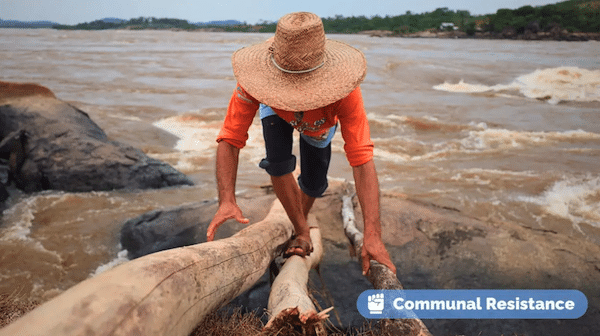In Venezuela’s Amazonas state, fishing has long been not just a trade but a whole way of life rooted in collaboration, knowledge sharing, and mutual aid. Now, under the U.S. blockade, fishing has become an even more important source of food. At the same time, the cooperative way of working of traditional fisherpeople has proven useful in solving blockade-induced obstacles.
The following study looks at the Ayacucho Commune, which is based on fishing and located in Amazonas’ capital city, Puerto Ayacucho. The Ayacucho Commune is an expression of the impressive synergy between a longstanding cooperative way of life, on the one hand, and a nationwide communal movement aimed at socialism, on the other.
The Ayacucho Commune comprises both Indigenous and criollo (non-Indigenous) fisherpeople. Their stories in this three-part series shed light on how fisherpeople are working together to build self-government and break their dependency on the capitalist market, while promoting food sovereignty in the region. In part I of this investigation, these fisherfolk explained the history of their commune and talked about their trade, and in part II they reflected on their collective practices. In this final installment, Ayacucho communards talk about the damage brought by the U.S. blockade to their trade and their lives.
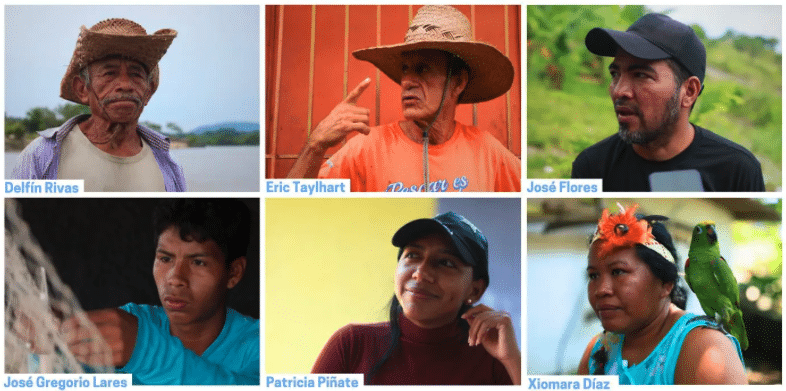
Delfín Rivas is a 73-year-old fisherman and a promoter of the CONPPAs (fisherfolk councils) | Eric Taylhardt is a housing spokesperson for the Ayacucho Commune and a CONPPA member | José Flores is the state coordinator of fisherpeople for the Ayacucho Commune | José Gregorio Lares is a young fisherman | Patricia Piñate is a spokesperson for the July 5 Communal Council | Xiomara Díaz is a spokesperson for the Ayacucho Commune and UBCH (local PSUV structure) leader. (Photo: Rome Arrieche)
The U.S. blockade
The impact of the unilateral coercive measures promoted by the U.S. government is devastating: tens of thousands have died and production fell dramatically. However, at the Ayacucho Commune, people did not give up; they continue to organize and look for creative solutions.
José Flores: Venezuela is rich in natural resources—water, minerals, and oil—and has an authentic project of its own, which has much to do with sovereignty. The U.S., on the other hand, seeks to take what belongs to us and tries to make sure that no country disrupts its political and ideological control over much of the world. That’s exactly why the blockade against Venezuela—against every one of us really—was put in place.
When the blockade descended upon us, we found ourselves without supplies and without financial support from institutions, so we fisherfolk had to adapt and become even more self-reliant. Between 2015 and 2020, production dropped by about 60%; now the economic situation is looking a bit brighter, but we still face many obstacles.
Someone might ask why production dropped so dramatically, since the river is right here and the fish are not sanctioned. By 2016, fishing implements were becoming scarce and very expensive. It became harder and harder to maintain our bongos [metal boats] and outboard motors, and gasoline was very costly and scarce at one point.
Of course, it’s not just the blockade that affects us; climate change, overfishing, and illegal mining–which pollutes the rivers–have all impacted fish populations, but the blockade’s impact has been enormous.
This year, however, we had a good ribazón [peak fishing season], but even that has its challenges. With more people returning to the trade in recent years, there are now twice as many fisherpeople in our commune. During the ribazón this reduces the value of the catch and makes it harder to earn a living.
Eric Taylhardt: Since the beginning of the blockade, the fishing fleet has declined by approximately 70%, largely due to the high cost of repairs. Before the blockade, our fleet had around 80 motorboats, but today only about 25 are operational in the Ayacucho Commune.
For this reason, some people fish with curiaras [small boats made out of wood], using paddles instead of motors. While curiaras also deteriorate and need to be replaced every so often, they can be handcrafted with trees that grow along the margins of the Orinoco. Maintaining them is much easier as well.
Xiomara Díaz: The blockade has made life on the river much harder. Basic implements such as fishing lines, hooks, and weights have become expensive and difficult to find. Maintaining the motors is really hard, so many fisherfolk have gone back to traditional methods—fishing closer to the riverbanks with curiaras and line fishing are back.
Delfín Rivas: The blockade strikes at our sovereignty in border regions. Around the time of the hyperinflationary spiral, when the bolívar [currency] was nowhere to be found, we began to use the Colombian peso, but we also turned to barter: when we had no money, we would exchange fish for goods such as oil or sugar.
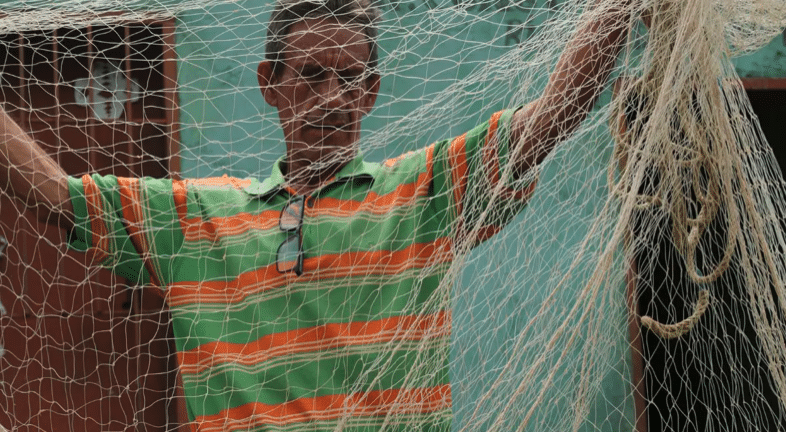
Fisherfolk check the net before going out on the river. (Photo: Rome Arrieche)
GENDER-BASED VIOLENCE AS A CONSEQUENCE OF THE BLOCKADE
Xiomara Díaz: The economic impact of the blockade has been severe. The children of many fisherfolk dropped out of school and some families left the country. In our community, women have been hit particularly hard, and many have had to migrate to seek work abroad, often having to leave their children with relatives. Tragically, some of these women have been killed, and others never came back. The life of migrant women is really very harsh—the stories are heart-wrenching.
In our community, we’ve seen a lot of suffering: children are growing up in very difficult conditions and we have witnessed an increase in gender-based violence. This should come as no surprise: poverty, in this case the poverty induced by the blockade, always comes with a stepping up in violence in general, and specifically gender-based violence.
In fact, I’m sure that the people in the U.S. government who design the policies against Venezuela are fully aware of the devastating impact that sanctions have. They may say that their intention is to undermine President Maduro’s government, which is bad enough, but they are actually attempting to do it by bringing violence, death, and desperation to every last Venezuelan.
However, in the commune, we’ve organized to report cases of abuse against our compañeras. Several men guilty of gender-based violence are behind bars. We are organized and will not allow for proprietary “love” to turn into death.
We hold workshops, have created street patrols, and work with local leaders to tackle this problem. The Attorney General’s Office also sends psychologists to handle confidential complaints. In the face of gender-based violence, it’s not enough to file reports—the solution is to be found in an organized community that works together with authorities.
While patriarchy is structural in a capitalist society, at the end of the day we also know that the spike in gender-based violence is linked to the U.S. blockade. The blockade must cease immediately. Blood, a lot of blood, is on their hands.
GAS SHORTAGES AND COLLECTIVE SOLUTIONS
José Gregorio Lares: The blockade has deeply affected us, but fishing has been our lifeline during the crisis. One of the biggest challenges has been getting fuel for our boat engines. In this situation, many fisherfolk have had no choice but to return to the traditional curiara and paddles to go on working. To state the obvious, the catch is greatly reduced because mobility in a curiara is limited.
Delfín Rivas: The fuel shortages have impacted our fishing practices a great deal. We need significant amounts of gasoline to locate fish schools along the Orinoco. In the past, I used three drums of fuel monthly [600 liters]. Then, when the fuel shortages were most dramatic, I would count every drop of gasoline and I had to restrict my radius radically.
Fortunately, now we have a weekly allocation of 50 liters via the Amazonas state government which adds up to 200 liters [monthly]. However, sometimes I cannot afford to pay for the gas, and even when I can, that does not take you very far.
In short, while the overall situation has improved, our catch remains relatively small when compared to the years before the blockade. Frankly, sometimes it’s barely enough for family consumption.
José Flores: Fuel shortages have plagued frontier regions like ours for decades, but the blockade made the situation critical. When the gas stations in Puerto Ayacucho went dry, those who could afford it crossed the river to Colombia, where gasoline was available but at much higher prices, or had to turn to black-market suppliers. The price at the peak of the fuel shortages was exorbitant, reaching four USD per liter. This led to mounting debts for many, while others retreated to the shore or to their curiaras.
But as we always do, we organized; we look for a collective solution to collective problems. Through the efforts of the CONPPA [Fisherfolk Councils] and in coordination with the PSUV and the state government, a dedicated fuel station named “Fluvial Orinoco” reopened a year ago. Now every fisherfolk who has a motor can purchase 50 liters of gasoline weekly at international prices [50 U.S. cents a liter]. This has been a huge victory, but we are still in the struggle. While we recognize the government’s goodwill, we demand that the gasoline be sold to fisherfolk at [subsidized] national and not international prices.
It’s been a little over a year since this happened, but it didn’t happen overnight. Our process of organization was done over the long haul: it began with assemblies, took us to public official’s offices, and concluded with a census of all the existing outboard motors to allocate the quotas. Fisherfolk had to provide extensive documentation—boat registration, outboard motor papers, navigation licenses, and other certifications—to qualify for fuel allocations. More recently [state oil company] PDVSA carried out inspections to ensure compliance. While we’re still waiting for subsidized rates, the current system has provided some relief, allowing us to continue working, albeit on a limited scale.
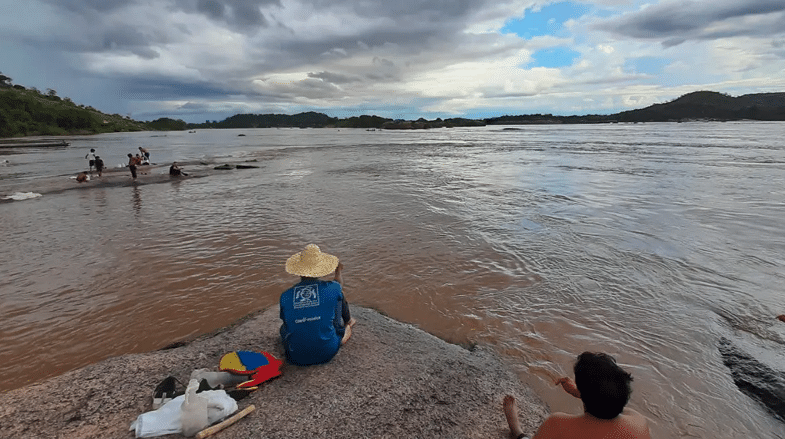
Riverside fishing has become more common with the blockade. (Photo: Rome Arrieche)
MINING
José Flores: The consequences of the blockade are so many, so diverse, and so brutal that sometimes it’s hard to get one’s head around it. When things got dire, many people, especially young men, went to the gold mines. They left families behind, sometimes selling everything they had, and off they went. Of course, the conditions there were really exploitative and dangerous.
This began about four or five years ago. Most of them went to Yapacana Park and other nearby mining sites, and some went to Bolívar state.
About one year ago, the government intervened in Yapacana Park and put an end to illegal mining in that place that is not only an ecosystem of enormous importance, but also a place that has spiritual importance for many Indigenous communities.
The government evacuated miners and many have been coming back to our communities. Sadly some will never return.
We celebrate the government’s intervention because mining is not only a dangerous and exploitative practice, but also because our rivers, especially upstream, were becoming polluted with mercury and fuel. In fact, many Indigenous communities upstream have been unable to rely on fishing for sustenance because of the environmental impact of mining.
Little by little the river will recover, but I want to highlight here that the footprint of the blockade is not only economic and political. It’s also environmental.
Eric Taylhardt: In the mines, gold is extracted using mercury, which pollutes the rivers and poisons the water. There are areas of the Upper Orinoco where fish are no longer reproducing because of this.
Another issue impacting us is aquarium fishing—catching fish that don’t grow too big to have as pets. Recently, however, people have started catching juvenile sapoara, which is not an aquarium fish. On the Colombian side, they buy large quantities of these juvenile fish as if they were pets, reducing the river’s biodiversity further.
MIGRATION, THE RETURN HOME TO FISHING
Patricia Piñate: Between 2017 and 2020, we experienced significant migration to Colombia, to other countries, and to the mines. People knew things away from home would not be easy, but the situation here was dire. Many people could only afford to buy one kilogram of meat a month while medicines were hard to get and very expensive.
Those of us who stayed behind managed to survive by selling a few things—coffee, sugar, chucherías [candies]—out of our homes. Professionals stepped out of their offices and reinvented themselves [with side businesses] to make ends meet, sometimes returning to the river and picking up on their family’s old fishing trade.
Previously we had an estimate of around 700 fishermen in Amazonas, but according to the latest report from the Ministry of Fishing, there are approximately 2,000 fisherfolk across the state now.
A fisherperson grows up in a fishing family and dedicates their life to the trade, falling in love with the river from a young age. But at the same time, fisherfolk also strive to improve their children’s quality of life—while we love the river, we also know its dangers and hardships. That’s why fisherfolk work hard so that their kids can go to school and even university, and perhaps become accountants or lawyers.
While all this pains us deeply, we are happy that some people are returning to the community and reconnecting with their roots. Now, many say: “I’m a doctor,” or “I’m a lawyer,” and they add, “but I also fish, and I fish with pride!”
Eric Taylhardt: I’m an electrician by trade and an operator of electrical power plants and substations. However, I was raised in a fishing family and learned the ways of the Orinoco from them. In 2016, I returned to fishing because the economic crisis was hitting us too hard and I had to support my family. The blockade had put us in a tough place.
When I returned to fishing, my economic situation began to improve. The state of Amazonas is defined by the Orinoco River, which shapes the daily lives of its people. While the return to fishing wasn’t easy, I’m now happy to be part of the river’s economy.
My return to fishing also meant that I reconnected with my community and, eventually, I became an associate of the El Campito CONPPA, which is in the territory of the Ayacucho Commune.
Over these years I have learned that we will only collectively be able to solve our problems.
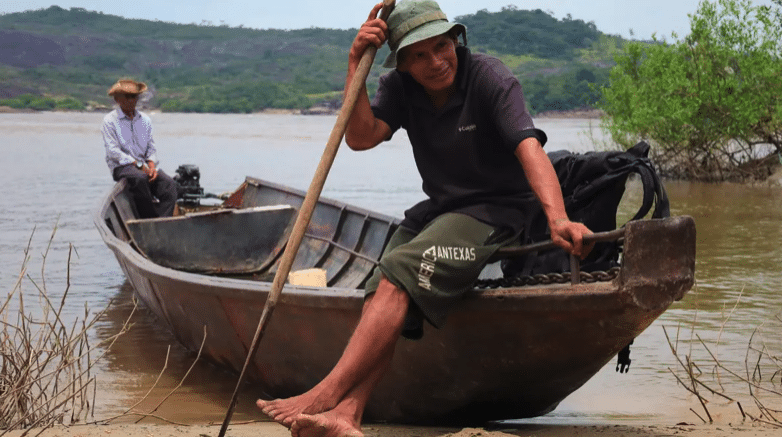
The days are long on the Orinoco River. (Photo: Rome Arrieche)
SOLIDARITY
José Flores: We fisherfolk are humble people with big hearts, and we understand the needs of others. This was especially evident during the worst of the blockade, when we reinforced our collaborative practices. We had many bad years, but even then, fishermen maintained the practice of giving away some of their catch to those in need.
In other words, fisherfolk fish for themselves and for the market, but they also do it with the community in mind. We share everything—the bongo, the fishing net, and even the shelters we build to protect ourselves from the sun and from the rain when we go out fishing. This solidarity is a defining trait of fisherfolk and that, together with our culture of cooperation, became a lifeline during the ugliest years.
Patricia Piñate: The blockade has forced us to organize and support one another as brothers and sisters regardless of political affiliation or ideological beliefs. In all this, the commune, which is Chávez’s proposal but brings us all together for the greater good, has also played an important role.
José Flores: Chávez was right when he said “Commune or nothing!” and President Maduro is also making the right choice when he turns to the commune.

